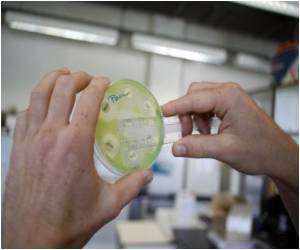People with no exposure to livestock are becoming infected with this new strain of poultry-associated MRSA, most likely by eating or handling contaminated poultry meat.

‘Poultry-associated MRSA may be more capable of transmitting from food to people. Ten people living in urban areas of Denmark that had been colonized or hospitalized with MRSA.’





The study focuses on a special newly identified strain of MRSA associated with poultry. MRSA is often found in chickens, pigs and other food animals. Researchers know that farmers, farm workers, veterinarians and others working directly with livestock are at risk of MRSA infections. However, this new study, by an international team of researchers headed by Robert Skov, MD, at Statens Serum Institut and Lance Price, PhD at the Milken Institute School of Public Health (Milken Institute SPH) at the George Washington University, shows that people with no exposure to livestock are becoming colonized and infected with this new strain of poultry-associated MRSA — most likely by eating or handling contaminated poultry meat.“We’ve known for several years that people working directly with livestock are at increased risk for MRSA infections, but this is one of the first studies providing compelling evidence that everyday consumers are also potentially at risk,” says Lance Price, PhD, Director of the Antibiotic Resistance Action Center, which is based at Milken Institute SPH, and Director of Translational Genomics Research Institute Center for Food Microbiology and Environmental Health.
“This poultry-associated MRSA may be more capable of transmitting from food to people. As MRSA continues to evolve, it may spread from animals to people in new ways,” adds Jesper Larsen, PhD, a scientist and veterinarian at the Statens Serum Institut (Denmark’s equivalent to the U.S. Centers for Disease Control and Prevention), and lead author of the paper.
The researchers reviewed the national database at Statens Serum Institut and found 10 people living in urban areas of Denmark that had been colonized or hospitalized with MRSA. Skov, Price and their colleagues then used a type of sophisticated genetic analysis to study the MRSA from those cases and compare it to strains found in people, livestock and food products from other European countries.
The researchers found:
- Ten Danes living in cities were colonized or infected with a novel strain of poultry-associated MRSA, a type of livestock-associated MRSA never identified before. None of the 10 people had worked on farms or had direct exposure to food animals.
- The strain of poultry-associated MRSA identified in the study was not found in Danish livestock but could be traced to poultry meat imported from other European Union countries.
- Isolates of the new strain found in the urban-dwelling Danes were virtually identical to each other, a finding that suggests they were all exposed from a common source — most likely contaminated poultry meat.
Advertisement
“We need to expand the number of pathogens that we test for in our food supply, and we need international leadership to reduce unnecessary use of antibiotics on industrial farms around the world,” Price says. “This isn't a problem unique to the EU or Denmark. Superbugs don’t respect political or geographical boundaries, so we have to work together to address this public health threat. I’m not sure that our international trade agreements are prepared to handle the specter of superbugs in meat.”
Advertisement
The multi-center study, Evidence for human adaptation and Foodborne Transmission of Livestock-Associated Methicillin-Resistant Staphylococcus aureus, published today in the journal Clinical Infectious Diseases, was an international collaboration involving 25 institutions and led by researchers at the Milken Institute SPH, the Statens Serum Institute in Copenhagen, Denmark and the Translational Genomics Research Institute in Flagstaff, AZ.
Funding for this study was provided by the National Institute of Allergy and Infectious Diseases, National Institutes of Health.
Source-Newswise










